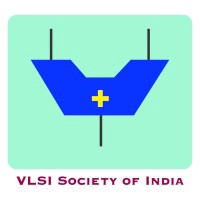CALL FOR PAPERS
- The aim of the VLSI Design & Test Symposium (VDAT-2024) is to foster a platform where academia, researchers, startups, and industrial practitioners can exchange innovative ideas, share experiences, and disseminate knowledge across diverse realms of VLSI Design and Testing.
We invite submissions of abstracts for papers and accompanying presentations that delve into highly technical content and explore emerging trends across VLSI Design and Testing domains. To submit your work, kindly provide an electronic copy of the entire paper. All the full-length papers presented at the conference will be submitted to IEEE Xplore Digital Library subject to meeting the quality requirement of IEEE, and subsequently indexed in Scopus.
Submissions are welcome in, but not limited to, the following areas:
TRACKS
 Emerging Devices and Material Technologies
Emerging Devices and Material Technologies
 Emerging Devices and Modeling
Emerging Devices and Modeling Si-Photonics and Optoelectronics devices
Si-Photonics and Optoelectronics devices MEMS/NEMS
MEMS/NEMS Organic electronics
Organic electronics 2D and advanced material electronics
2D and advanced material electronics Emerging memory technologies
Emerging memory technologies
 VLSI Circuit and System Design
VLSI Circuit and System Design
 Analog, Mixed Signal and RF IC Design
Analog, Mixed Signal and RF IC Design Digital VLSI Architectures
Digital VLSI Architectures Clock-generation and distribution circuits including all digital PLLs and DLLs
Clock-generation and distribution circuits including all digital PLLs and DLLs Circuit design for reliability effects such as gate oxide integrity, electro-migration, ESD, HCI, NBTI, PBTI etc.
Circuit design for reliability effects such as gate oxide integrity, electro-migration, ESD, HCI, NBTI, PBTI etc. Hardware accelerators for machine learning (ML) and deep learning algorithms
Hardware accelerators for machine learning (ML) and deep learning algorithms Hardware implementations of ML algorithms for applications like image/object recognition, computer vision, speech recognition, and natural language processing
Hardware implementations of ML algorithms for applications like image/object recognition, computer vision, speech recognition, and natural language processing ML-based intelligence in IoT under highly constrained energy/power requirements
ML-based intelligence in IoT under highly constrained energy/power requirements Secure and intelligent system on chip (SoC) design for automotive, health and defense applications
Secure and intelligent system on chip (SoC) design for automotive, health and defense applications
 CAD for VLSI
CAD for VLSI
 Logic and behavioral synthesis
Logic and behavioral synthesis Floor planning, Placement, Clock Tree Synthesis and Routing algorithms
Floor planning, Placement, Clock Tree Synthesis and Routing algorithms Design Automation and Methodologies
Design Automation and Methodologies Trusted design automation and Tool flow
Trusted design automation and Tool flow
 Testing and Verification
Testing and Verification
 Design verification, Test, Reliability and Fault tolerance
Design verification, Test, Reliability and Fault tolerance Formal verification
Formal verification DFT
DFT Fault modeling
Fault modeling Pre-Silicon Design, Verification and Validation
Pre-Silicon Design, Verification and Validation Post-Silicon Validation
Post-Silicon Validation Analog - Mixed-Signal - RF Test
Analog - Mixed-Signal - RF Test Functional safety and test methods
Functional safety and test methods Testing memories and regular logic arrays
Testing memories and regular logic arrays Design for manufacturability and yield analysis.
Design for manufacturability and yield analysis.
 Embedded Systems Design
Embedded Systems Design
 FPGA based designs, Hardware/Software co-design and verification
FPGA based designs, Hardware/Software co-design and verification Audio, Image and Video processing
Audio, Image and Video processing Reconfigurable systems
Reconfigurable systems Microcontroller, ARM, IoT and FPGA-based Embedded systems design
Microcontroller, ARM, IoT and FPGA-based Embedded systems design Embedded software
Embedded software CAD for FPGA and Embedded systems
CAD for FPGA and Embedded systems
 Emerging Processors for System Design
Emerging Processors for System Design
 RISC-V based Design
RISC-V based Design Artificial intelligence and ML-based systems, Cyber-Physical Systems
Artificial intelligence and ML-based systems, Cyber-Physical Systems Cryptographic Architectures
Cryptographic Architectures Neuromorphic Architectures
Neuromorphic Architectures Quantum Computing
Quantum Computing
Submission Guidelines
- Authors are invited to submit original, unpublished research manuscripts on the above topics. Papers should be submitted in pdf format (Portable Document Format) as per the IEEE Conference paper format.
- The number of pages should not exceed six A4 size pages and paper should be uploaded through Microsoft CMT.
- There will be double blind review of the paper. Therefore, do not include 'authors' name in submitted paper. A paper with 'authors' names will not be considered for review.
- The paper must include an abstract of about 250 words with maximum of five keywords.
- Authors of the accepted papers will be informed by email. Information about necessary revisions will be communicated to the corresponding author through email.
- The author(s) will have to incorporate the suggestions and will have to send the revised camera-ready copy of the paper as per the final submission guidelines within the given time limit.
- It is mandatory for at least one of the authors to register for publication of the paper in proceedings. For the author presenting more than one papers, it is mandatory to register and present each paper separately.
- All the full-length papers presented at the conference will be submitted to IEEE Xplore Digital Library subject to meeting the quality requirement of IEEE, and subsequently indexed in Scopus.




 Emerging Devices and Material Technologies
Emerging Devices and Material Technologies Emerging Devices and Modeling
Emerging Devices and Modeling VLSI Circuit and System Design
VLSI Circuit and System Design CAD for VLSI
CAD for VLSI Testing and Verification
Testing and Verification Embedded Systems Design
Embedded Systems Design Emerging Processors for System Design
Emerging Processors for System Design